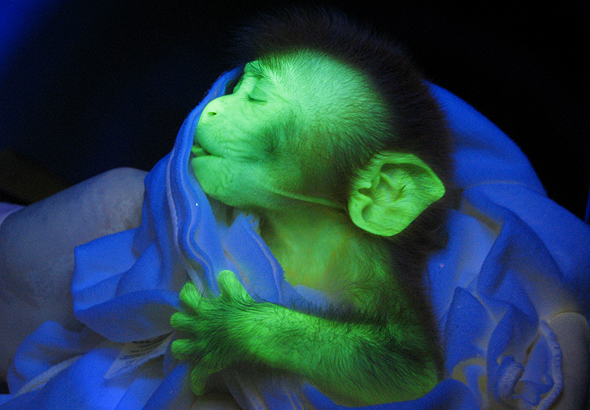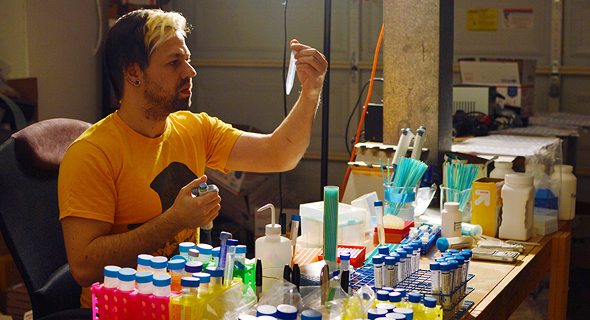The Bio-Hacker From the Garage Next Door
Dogs that glow in the dark and people who mess with their own genetic code: an Israeli filmmaker went on a journey to visit people who rewrite DNA using technology they ordered online with a few hundred dollars
Like many other people, David Ishee's hobby evolved out of distress. A young man who lived in Mississippi and worked at a local gas field, he survived a violent robbery attempt by two armed men. Some time after that, to fortify his sense of safety, he bought a mastiff, considered the ultimate guard dog. Unfortunately, like many purebreds, the dog suffered from genetic mutations that made it sick and tired. Disappointed, Ishee turned to dog breeding in the hopes of creating a dog that will be up for the job.
Dog breeding has existed for millennia, a manifestation of humanity's need and desire to control and reshape nature. But a few years ago, Ishee's time-old hobby evolved when he learned about CRISPR, a revolutionary technology that makes gene editing more accessible than ever. CRISPER is so inexpensive, in fact, that people can experiment with it in the middle of nowhere, Mississippi. Ishee knew he wanted to use it to clean the genome of purebred dogs from hereditary diseases, but first he wanted to prove to himself and to the world that he knows what he is doing. He chose a more modest—and much more bizarre—project: he is now trying to edit medusa genes into his dogs to make them glow in the dark.
 A glow-in-the-dark monkey. Photo: Anthony Chan
A glow-in-the-dark monkey. Photo: Anthony Chan
Ishee, who appears in the first scene of Unnatural Selection, a new Netflix documentary series created by Leeor Kaufman and Joe Egender, may appear bonkers. But while he himself has yet to achieve success, the technology he is using is completely applicable. Academic labs have already produced glow-in-the-dark rats, glow-in-the-dark cats to hunt the rats, and to complete the menagerie, glow-in-the-dark monkeys, sheep, and pigs.
Until CRISPR came along, gene editing was complex, very expensive, and basically inaccessible to anyone who was not heavily funded or trained. CRISPR's revolution of genetic editing can be compared to the invention of the personal computer: while we are still far from the day a gene editing kit can be found in any household, initial tools can now be bought online. You have a few hundred dollars to spare and time to learn something new? Congratulations, you’re a genetic scientist. You can now change the canine genome, or the feline genome, or any DNA you want. Even human.
"The first phone call we made was to a geneticist named Preston Estep," Kaufman said in a recent interview with Calcalist, referring to American biologist Preston W. Estep III, who is one of the scientific experts featured in Unnatural Selection. "It was our first interview, still during the research stage. Estep said a lot of things that blew my mind, but one of them did so more than others: we no longer have to accept the laws of natural selection. It can sound bad, but natural selection is cruel. A lot of people suffer due to it.”
Unnatural Selection was born three years ago when Kaufman, an Israeli who resides in Los Angeles, set down for a brainstorming session with Egender. They were talking about basing a project off a science fiction book when Egender brought up genetic editing. “Initially, I thought it was still in the realms of science fiction,” Kaufman said. “I said, you mean there are people capable of slicing the human genome at this very moment? People who think about the world of tomorrow, who understand the ethical and financial dilemmas of the future? Forget science fiction, let’s give them a call.”
The result is a four-episode series that looks at the complexities of the field by consulting experts and academic labs, and also by visiting quite a lot of garages where geeks with genetic editing kits engineer various critters. In one of the labs the two filmmakers visit, in Ouagadougou, the capital of Burkina Faso, a team is trying to take on malaria, a mosquito-borne infectious disease. According to the World Health Organization, 217 million cases of malaria occurred in 2017, with 92% of cases and 93% of deaths occurring in Africa. The team is trying to engineer infertile mosquitoes to eradicate both the bugs and the disease, and the initiative—like similar ones before it—is also drawing much criticism for its unknown consequences on the local ecosystem.
The most important question the series brings up is about environmental engineering, Kaufman said. “Our ability to make decisions in this field can create miracles—heal the environment, eradicate severe illnesses, save endangered species—that is huge,” he said. “On the other hand, it brings up very scary questions about interfering in nature, the democratization of genetic engineering, the fear that someone will use this technology to do something bad and make people stop wanting to develop it further. And at this point we didn’t even know bio-hackers exist.”
Bio-hackers are private people who decided to take on the challenge of genetic engineering, usually without formal education, sometimes using their own bodies as test subjects. A quasi-leader and unofficial spokesperson of this movement is Josiah Zayner, who has a doctorate in physics and previously worked for NASA. Zayner firmly believes that science should not be the purview of scientists alone. To encourage the public to participate, he partakes in activism that is borderline online trolling, even urging people to experiment on themselves.
 Josiah Zayber. Photo: The Odin
Josiah Zayber. Photo: The Odin
In October 2017, Zayner was perhaps the first person to inject himself with edited DNA. During a lecture held in front of a full room, he injected his arm with DNA intended to inhibit myostatin, a protein that limits muscle mass. His goal was to prove that people could change their molecular structure for less than $500. The experiment failed; Zayner later said that to get the results, he needed more injections and more edited DNA.
Zayner also founded biohacking-promoting startup The Odin, which he operates from his garage and which sells home gene-editing kits. $30 will buy you a glow-in-the-dark beer kit, while a more advanced kit for editing the genes of bacteria will set you back $160. A real lab setup will cost you $1,850; not peanuts, but something people regularly pay for a bicycle or a drone. Zayner, it should be noted, was probed by California authorities on suspicion of practicing medicine without a license, but the investigation was dropped in September.
When Zayner and Kaufman first met, the former was at the beginning of his journey. For seven hours, Kaufman sat in his garage, watching him make kit after kit and answer questions in-between. Kaufman was worried about the possibilities the technology could offer, but Zayner had fascinating answers that went beyond “I want to and I can,” Kaufman said. “When you hear how powerful these technologies are, how they can affect the genetics of future generations, you immediately think to give it only to those who know what they are doing, but Zayner brings up an important question: what happens when the only ones who have this technology are governments, armies, or giant corporations? In a world where this technology exists, do you want to be subject to the whims of governments or multinationals? Shouldn’t private citizens have the ability to participate too?”
Many people—many scientists—do not like Zayner, but it is very important that someone ask these questions, and say that the little people should have that power, too, Kaufman said. “Many times, these technologies develop in ways that do not conform to our initial expectations.”
While Kaufman does not know how the future will look, making the series has caused him to be more hopeful, he said. Technology is a tool and its development could help better people’s lives, but because he is afraid of technology being abused by powerful entities, it is critical that people will have knowledge of it, he said. “It creates some type of social supervision, and at least an ability to raise red flags.”
Gene editing abilities could be compared to the issue of data privacy—until recently, it interested mostly people working in the field, but in the era of social networks it has risen to public awareness. When it comes to the technologies of the future, those that will impact life substantially, companies have a very big incentive to charge through the nose, Kaufman said. “That brings up a much bigger ethical question: will this technology create a healthier, more equal society, or will it increase inequality? If you charge $850,000 per injection, what are the odds someone in Africa will receive it?”
Bio-hackers presume to tackle that inequality by making genetic editing the purview of more than just pharma companies. Tristan Roberts, also featured in the series, is a shy, skinny man who contracted HIV. Roberts injected himself with an untested and experimental gene therapy intended to attack the virus. His initiative sounds admirable, if dangerous, until you meet Aaron Traywick, the man who funded Roberts’ experiment, as well as those of other bio-hackers. The experiments made headlines, and later, when Traywick pushed Roberts into more and more experiments, things came to an explosive end. Roberts has continued to study the field, though more carefully. Traywick met his end in April in a sensory deprivation flotation tank in a Washington spa, but before that he succeeded in making himself a pariah in the bio-hacker community for trying to sell the modern-day equivalent of snake oil.
The meeting with Traywick showed Kaufman the problem with Zayner’s ideology of opening the technology to the masses, he said. “If there is a conception that anyone can do it, it opens the door to people like Traywick, who looked to make a profit by promising things he could not deliver.”
They tread with caution when making the series, Kaufman said, because they didn’t want to create fear of certain countries. “There is a divide between the will to do things carefully and under supervision, and the knowledge that posing too many barriers can hand over the lead to another country,” Kaufman said. In a Ukraine clinic featured in the series, for example, doctors create fetuses from the DNA of three people, a procedure that has been forbidden in the U.S., intended to counter infertility in one of the parents. That fear is the most concerning, Kaufman said, adding that the question therefore “is not whether to use technology to eradicate a disease, but how we as a society work together.”
One important subject Unnatural Selection does not discuss is the way commercial companies acquire genetic knowledge. “When you send a DNA sample to a company like 23andMe, which tests DNA and creates ancestral mapping, they keep your genetic code forever,” Kaufman said. “The more information they have, the more they can cross-reference. On the one hand, that enables us to discover disease causes, but on the other hand, those are things with a commercial value. It makes the personal data Google and Facebook collect on us seem like a joke.”
Three days after Unnatural Selection premiered, a new, more powerful genome editor called Prime Editing was announced, promising to push the field even further. “In the series they mention CRISPR a lot, and now there is CRISPR prime, and in two years they will be discussing another new thing,” Kaufman said. “In the long run, you realize the tool is just a tool. What is important is our ability as a society to change and re-edit the genome. Those are ethical, economic, and environmental questions we all need to continue asking.”



